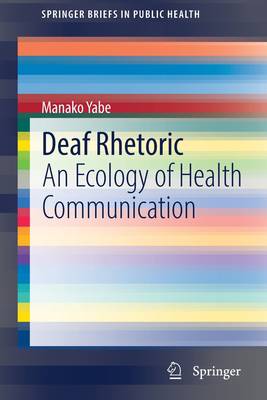
- Afhalen na 1 uur in een winkel met voorraad
- Gratis thuislevering in België vanaf € 30
- Ruim aanbod met 7 miljoen producten
- Afhalen na 1 uur in een winkel met voorraad
- Gratis thuislevering in België vanaf € 30
- Ruim aanbod met 7 miljoen producten
Zoeken
Omschrijving
This book guides healthcare professionals, hospital administrators, and medical interpreters in the United States (and internationally) in ways to better communicate with Deaf and Hard of Hearing (D/HH) patients and sign language interpreters in healthcare settings. It also provides an overview of the healthcare communication issues with healthcare professionals and D/HH patients, and the advantages and disadvantages of using in-person interpreters vs. video remote interpreting (VRI). Due to technology development, hospital administrators have popularized the use of VRI and reduced the number of in-person interpreting services, which have negatively affected the quality of medical interpreting services and patient-provider communication. The COVID-19 pandemic also has accelerated the move toward more VRI, particularly in the US.
The book addresses an understudied aspect of access and is written by an international deaf researcher from Japan who uses American Sign Language(ASL) and English as non-native languages. In order to identify appropriate interpreting services for specific treatments, the author focuses on healthcare professionals' and D/HH patients' interpreting preferences for critical and non-critical care in the US, and offers a new theoretical framework, an Ecology of Health Communication, to contextualize and analyze these preferences. The ecological matrix and its five analytical dimensions (i.e., physical-material, psychological, social, spatial, and temporal) allow readers to understand how these dimensions influence healthcare professionals' and D/HH patients' interpreting preferences as well as the treatment outcomes. This book concludes by prioritizing the use of an appropriate interpreter for specific treatments and allocating funds for in-person interpreters for critical care treatments.
Deaf Rhetoric: An Ecology of Health Communication is primarily designed for healthcare professional students and professionals, hospital administrators, medical interpreters, VRI companies, and healthcare researchers. Scholars interested in the communication preferences of healthcare professionals and deaf people also will find this text useful. The book counters some of the power differences between healthcare providers and those who use medical services, and subtly reminds others that deaf people are not solely the receivers of medical care but actually are full people. The field of health care is growing and medical schools are increasingly called on to address cultural competencies; this resource provides a needed intervention.
The book addresses an understudied aspect of access and is written by an international deaf researcher from Japan who uses American Sign Language(ASL) and English as non-native languages. In order to identify appropriate interpreting services for specific treatments, the author focuses on healthcare professionals' and D/HH patients' interpreting preferences for critical and non-critical care in the US, and offers a new theoretical framework, an Ecology of Health Communication, to contextualize and analyze these preferences. The ecological matrix and its five analytical dimensions (i.e., physical-material, psychological, social, spatial, and temporal) allow readers to understand how these dimensions influence healthcare professionals' and D/HH patients' interpreting preferences as well as the treatment outcomes. This book concludes by prioritizing the use of an appropriate interpreter for specific treatments and allocating funds for in-person interpreters for critical care treatments.
Deaf Rhetoric: An Ecology of Health Communication is primarily designed for healthcare professional students and professionals, hospital administrators, medical interpreters, VRI companies, and healthcare researchers. Scholars interested in the communication preferences of healthcare professionals and deaf people also will find this text useful. The book counters some of the power differences between healthcare providers and those who use medical services, and subtly reminds others that deaf people are not solely the receivers of medical care but actually are full people. The field of health care is growing and medical schools are increasingly called on to address cultural competencies; this resource provides a needed intervention.
Specificaties
Betrokkenen
- Auteur(s):
- Uitgeverij:
Inhoud
- Aantal bladzijden:
- 55
- Taal:
- Engels
- Reeks:
Eigenschappen
- Productcode (EAN):
- 9783030962449
- Verschijningsdatum:
- 9/03/2022
- Uitvoering:
- Paperback
- Formaat:
- Trade paperback (VS)
- Afmetingen:
- 156 mm x 234 mm
- Gewicht:
- 131 g

Alleen bij Standaard Boekhandel
+ 94 punten op je klantenkaart van Standaard Boekhandel
Beoordelingen
We publiceren alleen reviews die voldoen aan de voorwaarden voor reviews. Bekijk onze voorwaarden voor reviews.











